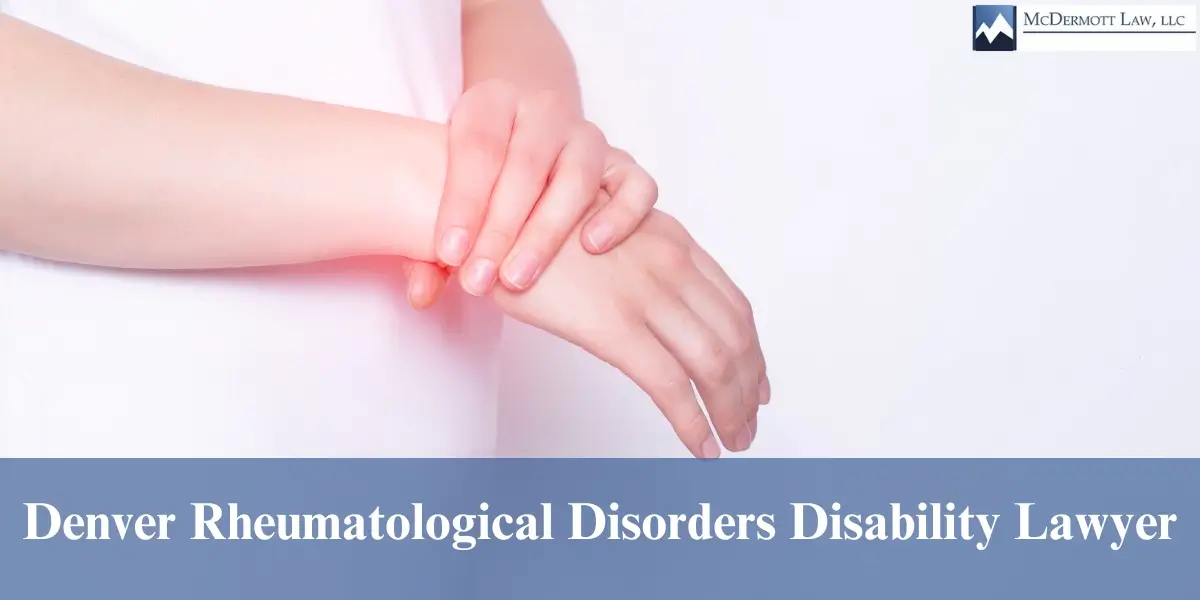Denver Rheumatological Disorders Disability Lawyer
Denver Rheumatological Disorders Disability Attorney
Arthritis is characterized by inflammation of one or more joints. Symptoms include joint pain and stiffness, and these symptoms generally worsen as you age. There are several different types of arthritis, affecting people in different ways. Our expert lawyers team at McDermott Law, LLC, including our skilled Denver Rheumatological Disorders Disability Lawyers, is dedicated to helping individuals with arthritis navigate the complex legal process. If your condition has become disabling, we can assist you in securing the benefits and support you deserve, ensuring your rights are fully protected every step of the way. 
i. Osteoarthritis / Degenerative Arthritis
Osteoarthritis is the most common form of arthritis and occurs when the cartilage on the ends of the bones wears down over time. The most commonly affected parts of the body are the hips, hands, neck, lower back, and knees. Symptoms include pain, stiffness, loss of flexibility, and bone spurs, among others. Osteoarthritis is a degenerative disease, and people find that as their condition worsens, they are less able to perform activities that they used to be able to do with ease. The pain can often be unbearable and make it nearly impossible to sit, stand, or walk for any length of time. If osteoarthritis has impacted your ability to work or perform daily tasks, a disability lawyer can help you navigate the complex claims process and secure the benefits you need to manage your condition and maintain your quality of life.
ii. Scapholunate Advanced Collapse (SAC)
Scapholunate advanced collapse (SLAC) refers to a pattern of wrist malalignment that has been attributed to post-traumatic or spontaneous osteoarthritis of the wrist. It is a complication that can occur with undiagnosed or untreated scapholunate dissociation.
https://radiopaedia.org/articles/scapholunate-advanced-collapse
iii. Psoriatic Arthritis
Psoriatic arthritis affects people who have psoriasis – a skin condition that exhibits itself with red, itchy patches. The main symptoms of psoriatic arthritis are joint pain, swelling, and stiffness. These symptoms can sometimes occur before the appearance of the skin condition. The symptoms can affect any part of your body – including your fingertips and spine. There is no cure for psoriatic arthritis, so treatment tends to run towards management of the symptoms. People with psoriatic arthritis demonstrate the same disabling factors as people with osteoarthritis and rheumatoid arthritis. These symptoms can make it extremely difficult for people to function in the workplace on a consistent, reliable basis.
iv. Rheumatoid Arthritis
Rheumatoid arthritis is an autoimmune disorder. This means the immune system attacks its own tissues. Rheumatoid arthritis typically involves the small joints in your hands and feet and affects the lining of your joints. Sufferers of rheumatoid arthritis typically experience swelling in the afflicted joints, along with stiffness, and pain. These symptoms can result in joint deformity. In addition to painful joints, rheumatoid arthritis can also cause fevers and fatigue. Repetitive movements can cause inflammation in the hands and wrists, making it difficult to do everyday activities. If the lower extremity joints are involved, one may have a very difficult time standing and walking due to pain and swelling.
Arthritis, Mayo Clinic (Mar. 7, 2018), https://www.mayoclinic.org/diseases-conditions/arthritis/symptoms-causes/syc-20350772
v. Fibromyalgia
Fibromyalgia is a disorder characterized by widespread musculoskeletal pain accompanied by fatigue, sleep, memory and mood issues. Researchers believe that fibromyalgia amplifies painful sensations by affecting the way your brain processes pain signals. Symptoms sometimes begin after a physical trauma, surgery, infection or significant psychological stress. In other cases, symptoms gradually accumulate over time with no single triggering event. Women are much more likely to develop fibromyalgia than are men. Many people who have fibromyalgia also have tension headaches, temporomandibular joint (TMJ) disorders, irritable bowel syndrome, anxiety and depression…The pain associated with fibromyalgia often is described as a constant dull ache, typically arising from muscles. To be considered widespread, the pain must occur on both sides of your body and above and below your waist. Fibromyalgia is characterized by additional pain when firm pressure is applied to specific areas of your body, called tender points. Tender point locations include: back of the head; between shoulder blades; top of shoulders; front sides of neck; upper chest; out elbows; upper hips; sides of hips; and inner knees.
Unfortunately, it is unknown what causes fibromyalgia, although several factors are considered, including weight, gender, age, and genetics. We often see insurance companies deny claims because of fibromyalgia, citing a lack of objective evidence.
While objective evidence generally does not exist in these cases, our office has multiple arguments against the insurance company’s insistence on objective evidence to grant benefits. In Denver, where access to specialized medical care and support can be critical, our experienced team is skilled at challenging the insurance company’s approach and advocating for the benefits you deserve. We understand that many conditions, particularly those involving chronic pain or invisible disabilities, cannot always be proven with objective medical tests, and we are committed to fighting for your rights.
Fibromyalgia, Mayo Clinic (Aug. 11, 2017), https://www.mayoclinic.org/diseases-conditions/fibromyalgia/symptoms-causes/syc-20354780.
Contact Us
For more information about your legal rights and entitlements, along with a professional evaluation of your potential case, set up a free Review of Denied Claims by calling us at 303-964-1800, or complete our contact form. We offer free Review of Denied Claims and represent clients throughout the Denver area and the Rocky Mountain region.
Get A Free Case Evaluation of Your Denied Claim
Fields Marked With An “*” Are Required



